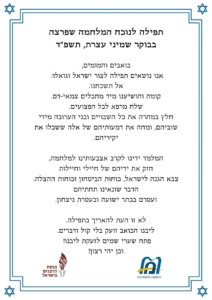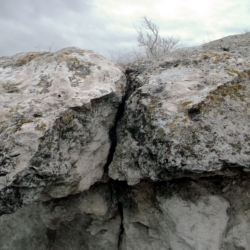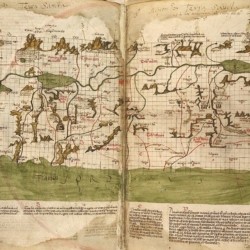Contributor(s): Shared on: Categories: Tags: | Source (Hebrew) | Translation (English) |
|---|
כואבים והמומים,
אנו נושאים תפילה לצור ישראל וגואלו:
אל תשכחנו.
קומה והושיענו מיד מחבלים צמאי־דם.
שלח מרפא לכל הפצועים.
חלץ במהרה את כל השבויים ובני הערובה מידי שוביהם,
ומחה את דמעותיהם של אלה ששכלו את יקיריהם. |
Shocked and stunned,
we pray to the Rock of Israel and its Redeemer:
Let us not be forgotten.
Rise up now and save us from bloodthirsty terrorists.
Send healing to all the wounded.
Quickly rescue all the captives and hostages from the hands of their captors,
and wipe away the tears of those who lost their loved ones. |
המלמד ידינו לקרב אצבעותינו למלחמה,
חזק את ידיהם של חיילי וחיילות צבא הגנה לישראל,
כוחות הביטחון וכוחות ההצלה.
הדבר שונאינו תחתיהם
ועטרם בכתר ישועה ובעטרת ניצחון. |
God who train our hands for battle and our hands for war,
strengthen the hands of all soldiers in the Israel Defense Forces,
and all security and rescue forces.
Subject our enemies to them
and crown them with deliverence and victory. |
לא זו העת להאריך בתפילה.
ליבנו הכואב זועק בלי קול ודברים.
פתח שערי שמים לזעקת ליבנו! |
This is not the time for lengthy prayers.
Our aching hearts cry out without sound or words.
Open the gates of heaven to the cry of our hearts! |
וכן יהי רצון! |
May it be Your will! |
A prayer offered by Rabbi Gil Nativ for the Masorti Movement in Israel and the Knesset haRabanim b’Yisrael in response to the invasion from Gaza on Shemini Atseret 5784 (2023), and disseminated via their Facebook page. Transcribed from the image by Aharon Varady. English translation by Shoshana Michael Zucker. (Thank you!) Source(s) Prayer in response the war that broke out on the morning of Shemini Atseret, 5784 (Knesset haRabbanim b’Yisrael and the Masorti Movement in Israel 2023)  “תפילה לנוכח המלחמה שפרצה בבוקר שמיני עצרת, תשפ”ד | Prayer in response to the war that broke out on the morning of Shemini Atseret 5784, by Rabbi Gil Nativ (Masorti Movement 2023)” “תפילה לנוכח המלחמה שפרצה בבוקר שמיני עצרת, תשפ”ד | Prayer in response to the war that broke out on the morning of Shemini Atseret 5784, by Rabbi Gil Nativ (Masorti Movement 2023)” is shared through the Open Siddur Project with a Creative Commons Attribution-ShareAlike 4.0 International copyleft license.
Rabbi Dr. Gil Nativ is the Rabbi of Kehilat Hakerem - the Masorti Community in Karmiel Rabbi Nativ is a third generation Israeli. He fought as a paratrooper in the Six Day War. HaTenu'ah haMasortit (התנועה המסורתית, the Masorti Movement in Israel) creates opportunities for all Jews to live Jewish lives in Israel unhindered, and on their own terms. It is a religious movement based on values of inclusion combined with traditional practice and Halakha (Jewish Law). Masorti represents a “third” way. Not secular Judaism. Not ultra-Orthodoxy. But a Jewish life that integrates secular beliefs. Halakhah with inclusion and egalitarianism. Tradition that recognizes the realities of today’s world. The Masorti Movement is committed to a pluralistic, egalitarian, and democratic vision of Zionism. Masorti engages tens of thousands of Israelis each year, young and old, native born as well as olim from around the globe. The Knesset haRabanim b'Yisrael (Rabbinical Assembly in Israel) is the central body of Masorti-affiliated rabbis in the State of Israel. It is closely associated with the Masorti Movement for Conservative Judaism in Israel, and the international Rabbinical Assembly. Aharon Varady (M.A.J.Ed./JTSA Davidson) is a volunteer transcriber for the Open Siddur Project. If you find any mistakes in his transcriptions, please let him know. Shgiyot mi yavin; Ministarot naqeni שְׁגִיאוֹת מִי־יָבִין; מִנִּסְתָּרוֹת נַקֵּנִי "Who can know all one's flaws? From hidden errors, correct me" (Psalms 19:13). If you'd like to directly support his work, please consider donating via his Patreon account. (Varady also translates prayers and contributes his own original work besides serving as the primary shammes of the Open Siddur Project and its website, opensiddur.org.) Shoshana Michael Zucker was first fascinated by the boundaries and history of Jewish liturgy as a teenager in NFTY in the early 1970s, the waning days of the Union Prayer Book. Since then, she has moved to Israel, raised a family and launched them into adulthood, while praying from varied siddurim with countless notes in the margin and extra notes stuck between the pages. A translator and editor by profession, she would rather study and teach Torah. Read a comment / Leave a comment (moderated) Works of related interest: |












Leave a Reply